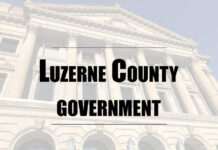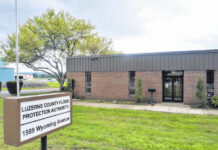
Electronic poll books in travel cases are lined up for pick-up outside Luzerne County’s election bureau for the May primary election. The county is seeking pricing on new poll books.
File photo
Luzerne County is seeking proposals for new electronic poll books used to sign in voters on Election Day, according to an online posting.
County Election Director Eryn Harvey said Monday she cannot support using the current electronic poll books in the November general election because it is too much of a risk.
“There were so many problems with them in the primary election, they can’t go out again,” Harvey said. “If we don’t get new ones, we will have to use paper poll books in November.”
If the administration decides to proceed with a purchase recommendation after receiving proposals, council approval would be required along with a determination on the funding source.
According to the request for vendor proposals, the county is seeking pricing for an initial purchase of 220 poll books, with an option to buy more units within a year. It notes the county has approximately 195,000 registered voters in 186 precincts.
All vendors submitting proposals must be equipped to accommodate the county’s anticipated Nov. 7 general election implementation of the new equipment, the request said.
The county purchased the current electronic poll books for $325,000 in 2018 from Election Systems & Software, with officials saying they would speed up voter processing and allow poll workers to instantly search and redirect voters who show up at the wrong polling place.
In the November 2022 general election, the election bureau switched back to paper poll books because staffers said the electronic ones were reaching their end of life and had created problems for some poll workers wrestling with technical issues.
The county’s five-citizen election board unanimously voted to activate the electronic books for the Jan. 31 special election because fewer devices were needed in that senatorial race covering only 18 of the county’s 76 municipalities. No problems were reported.
Harvey, who became election director in February, decided the electronic books would be used in the May 16 primary after they were inspected and tested to ensure they were properly functioning.
After the primary, Harvey reported some polling places had to register voters on paper due to battery issues with the electronic books, even though the vendor had tested all of them before they were deployed. Based on that experience, she concluded the county would have to revisit purchasing new electronic poll books, saying the current ones are getting too old.
Two companies had submitted proposals when the county sought poll book pricing in March, but these bids both approached $800,000, not including all ongoing support and maintenance and optional warranties, records show.
County Election Operations Manager Emily Cook said Monday that the new request-for-proposals has been revised to provide more specifics on what the county is seeking, based on concerns the first request was too broad.
Responses are due July 10.
Among the vendor requirements, according to the new solicitation:
• A file format to exchange data with Pennsylvania’s Statewide Uniform Registry of Electors (SURE) voter registration system, which will be the source of voter information loaded into the electronic books and updated post-election.
• System approval by the Pennsylvania Department of State.
• Itemized costs for each poll book, the required accessories, such as a stylus and stand, and any approved software needed to program, manage, update and maintain the electronic books.
• Documentation of security testing on the system.
• Ability to provide training to poll workers and election staff.
Space is provided in the submission form for vendors to respond to 39 questions about their system.
Harvey does not like paper poll books, saying poll workers struggled to direct misplaced voters to the correct polling places in the November 2022 general because that information would have been at their fingertips with the electronic poll books.
While serving as acting election director last November, election bureau Deputy Beth Gilbert had asked council to consider allocating an estimated $500,000 for new poll books.
Another option would be continued use of paper poll books with the addition of a secure phone app that allows poll workers to search voting locations for voters at the wrong polling place, Gilbert had said. The app would cost $30,000 to $40,000 annually and also serve as a “command post” for poll workers to report the status of polling place openings and closings, obtain checklists and report issues, she had said.
Reach Jennifer Learn-Andes at 570-991-6388 or on Twitter @TLJenLearnAndes.



